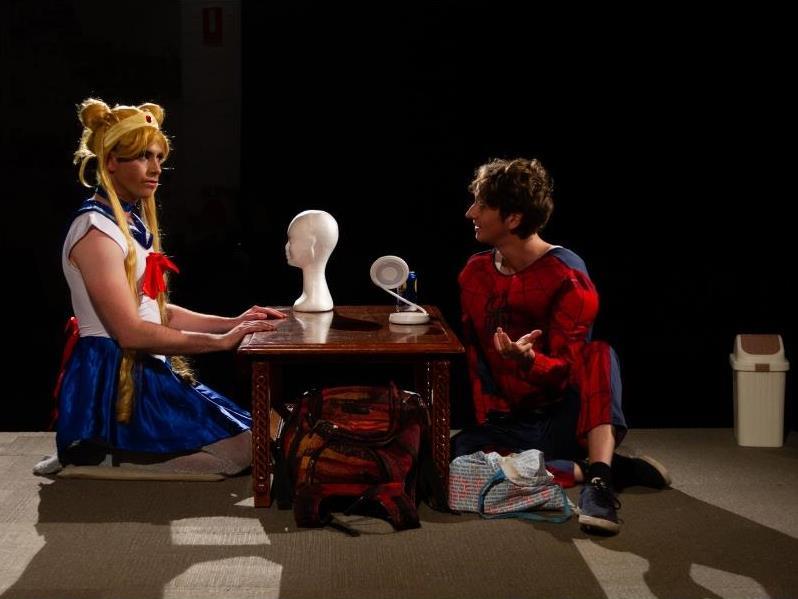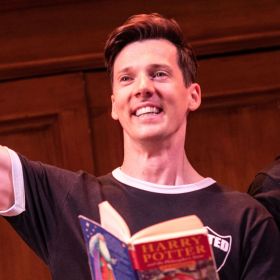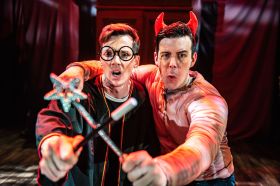Performers Adam Garner and Toby Blome. Image: Julia Kaddatz.
Disparate Scenes for Millennial Dreams is a brilliant new work that captures the spirit of millennial hope and despair, (over-)confidence and awkwardness, and joy and angst – a phantasmagoria that melds real, everyday conflicts with abstract but appreciable existential threats.
The triple bill is made up of three new short plays – by Ang Collins, Lewis Treston and Fiona Spitzkowsky – utilising different spaces within the Meat Market Stables.
The first act, by Spitzkowsky, is an immersive act featuring Him (Conor Leach) and Her (Dana McMillan), who have taken refuge in an art gallery where audience members stand among the exhibits. She appears to be seeking shelter, and he invites her to sleep overnight inside the gallery, which hosts his works and the works of his preceptor, artist and curator Karl. Karl is in the process of vacating this gallery and moving his ‘priceless’ works, so, as Karl’s devoted acolyte, he stands guard over the exhibits. The sounds of birds that, we are told, have long since become extinct echo around the room and become a leitmotif that appears throughout the play.
We then progress to the next act, by Treston: an awkward sexual encounter between two would-be fetishists in a condo in Japan. Adam (Adam Garner), an American itinerant performance artist dressed as Sailor Moon, soon tires of the earnest Trevor (Toby Blome), an Aussie backpacker dressed as Superman. But then the tables turn and the two are left completely discombobulated. The dialogue in this act is so brilliantly metaphysical, I wanted to write it all down even as it was being spoken. We hear about luggage ‘so compact and so economical, it screams resilience’. Adam gradually reveals his penchant for make-believe (‘I’m just your average guy living away from home who has decided that he can be whoever he wants to be at any given moment…’) and provokes the incredulous Trevor to the point of exhaustion (‘I don’t even know if that’s true.’ ‘I know – isn’t it fun?’). Trevor’s sudden turning-of-the-tables and willingness to indulge in make-believe then ends up provoking Adam. With pithy meditations on the nature of travel, romance, truth and reality, this act has the juiciest dialogue, and both actors inhabit their characters very well. For me, this was the strongest of the trio.
The third act, by Collins, dramatises a conflict between an idealistic and skittish indoor plant shop co-owner, Nina (Clarisse Bonello), and her shy but diffident intern, Ash (Heather Riley). I liked the biting comedy of this act, and there were moments of pure hilarity. What stood out for me was the abstract notion that the plant shop/warehouse was at the vanguard of a post-climate apocalypse revivalist movement (‘There’s a lifestyle revolution happening, and, as my intern, you are part of it.’). The seriousness of the prospect of a world bereft of plants is punctured by the absurdity of the notion that a plant shop run by the lovably scatter-brained Nina should be at the vanguard of the postlapsarian revolution. Ash’s spurned lover, musician Keiran (Toby Blome), introduces a comedy-of-errors element, and Blome perfectly captures the look, tone and sensibility of an incorrigible and clueless romantic (‘If being in love is dumb, then I’m a big idiot.’).
The last act, in which we return to Spitzkowsky’s Him and Her, has a distinctly Beckettian flavour. Evoking the forlorn and vituperative Vladimir and Estragon of Irish playwright Samuel Beckett’s Waiting for Godot, he and she taunt each other mercilessly and argue over seemingly minor irritants (like the distinctly millennial and ubiquitous sound of smartphone typing) while the interminable wait for Karl ends on an inconclusive, despairing note. Like the incorporeal but ever-present Godot, Karl, the artist/curator, has a presence that looms large over these two forlorn and fugitive figures, driving them both to the brink of despondency and destructive rage, even as the likelihood of his arrival wanes and (perhaps) the reality of his existence is progressively deconstructed.
The disparate scripts that comprise this work are excellent and full of hilarious, tense and poignant moments. They seamlessly blend the metaphysical and the banal, and translate to the stage very well. The physical space of the theatre has been used nicely, and one feels that the theatre makers have truly come to inhabit this space, leaving parts of their personalities in the engaging and eccentric artwork and props. The ideas and tensions (for example, between ownership and fleeting occupancy) that animate this work are reflected in the physical arrangement of the theatre and the manner in which the players have used the space.
My only caveat is that I found myself wishing that the pace of the performance, particularly in the heated second act, would slow down so that I could take a moment to let the dialogue sink in, and to appreciate the idiosyncrasies and foibles of the characters. However, the disparate parts feel in sync with one another, and with the pace of our times.
4 stars out of 5 ★★★★
Disparate Scenes for Millennial Dreams
Periscope Productions
by Ang Collins, Lewis Treston and Fiona Spitzkowsky
Cast: Dana McMillan, Conor Leach, Adam Garner, Toby Blome, Heather Riley, Clarisse Bonello
Director: Ben Sheen
Producer/dramaturg: Thomas De Angelis
31 May-6 June 2019
Meat Market Stables, North Melbourne
Tickets $27-$30





